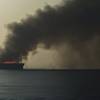Brent Slips below $105
Brent crude slipped under $105 a barrel on Monday, dropping from a one-week high hit on Friday, as U.S. intervention in Iraq eased concerns over the risk of disruption to supply from OPEC's second-largest producer.
* U.S. conducts air strikes on Islamic State targets in north Iraq
* Oil output in Iraqi Kurdistan unaffected by incursion
* Iraqi Kurdistani oil firms pull out staff due to conflict
Analysts have said that U.S. air strikes on Islamic State targets in northern Iraq over the weekend could help enforce stability in the country, curbing the risk of supply disruptions. Iraqi Kurdistan said on Friday that its oil output remained unaffected.
"For this week, there's going to be one word on traders' lips, and that word is 'Iraq'," said Ben Le Brun, a market analyst at OptionsXpress in Sydney.
September Brent crude dropped 5 cents to $104.97 a barrel by 0642 GMT. The contract jumped more than $1 to hit a weekly high of $106.85 on Friday before settling 42 cents lower.
U.S. crude gained 12 cents to $97.77 a barrel.
Oil is balancing between potential short-term supply disruptions, which so far have not materialised, versus long-term supply growth prospects, said Mark Keenan, head of commodities research Asia at Societe Generale.
Prompt Brent prices are unlikely to move higher unless there's a significant disruption in supply, he said, although prices have risen in the future months because of concerns about future output growth.
"Possibly for the first time in history, you've got geopolitical risks affecting long-term prices more than short-term prices which is obviously unusual," Keenan said.
Last week, Brent rose to a premium over immediate prices for the first time since 2012 on long-term supply concerns over tensions in Iraq, Libya and Ukraine.
Iraq's oil exports from the south remain at near record levels and the Kurdistan Regional Government's (KRG) oil pipeline via Turkey is operating normally and pumping 120,000 barrels per day (bpd) of crude oil despite an advance by Islamic State fighters in northern Iraq. "The Kirkuk pipeline was already down in March this year," Keenan said, adding that Kurdish crude oil exports via Turkey have largely remained unsold in the international markets. "So it's not really internationally available crude anyway," he said.
But the instability has prompted oil companies in Iraq and Iraqi Kurdistan to withdraw staff and raised doubts about whether Iraq will be able to raise output on the long run.
An increase in OPEC production in July has also weighed on prompt Brent. OPEC said the group managed to increase output in July despite violence in Iraq and Libya, pointing to more comfortable global supplies. The group also trimmed its 2014 global oil demand growth forecast for a second consecutive month.
U.S. crude futures remained supported, with immediate prices higher than those in future months, supported by low inventories at its delivery point in Cushing, Oklahoma. Cushing inventories fell to minimal operating levels after new pipeline capacities started diverting oil from Mid-west to the gulf coast earlier this year.
(By Florence Tan)













